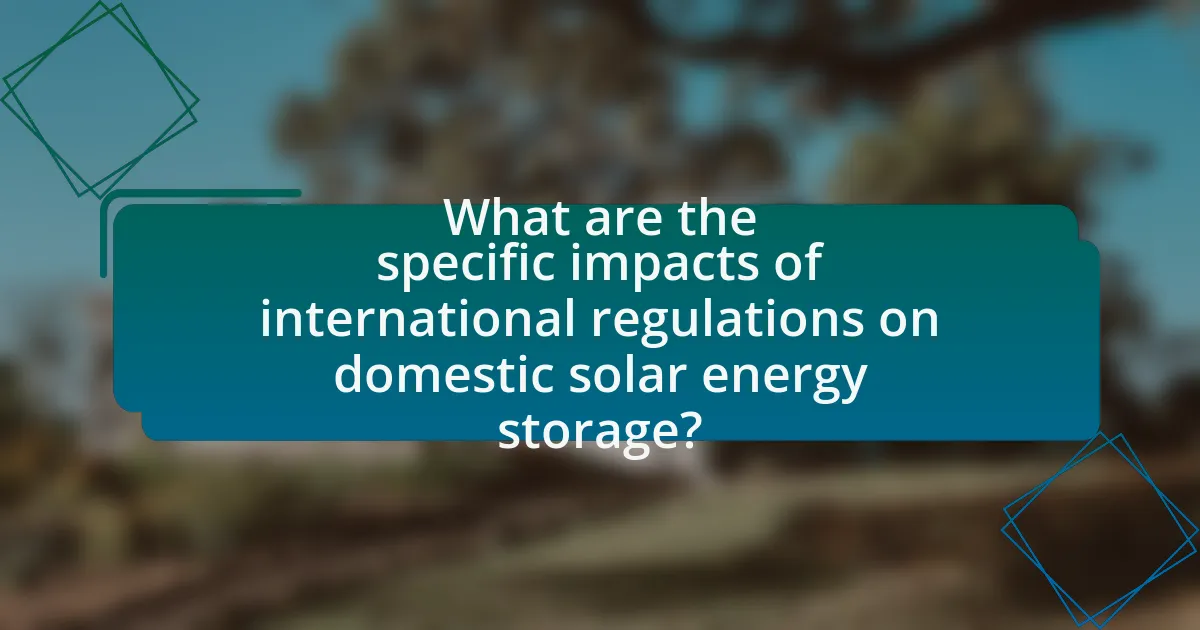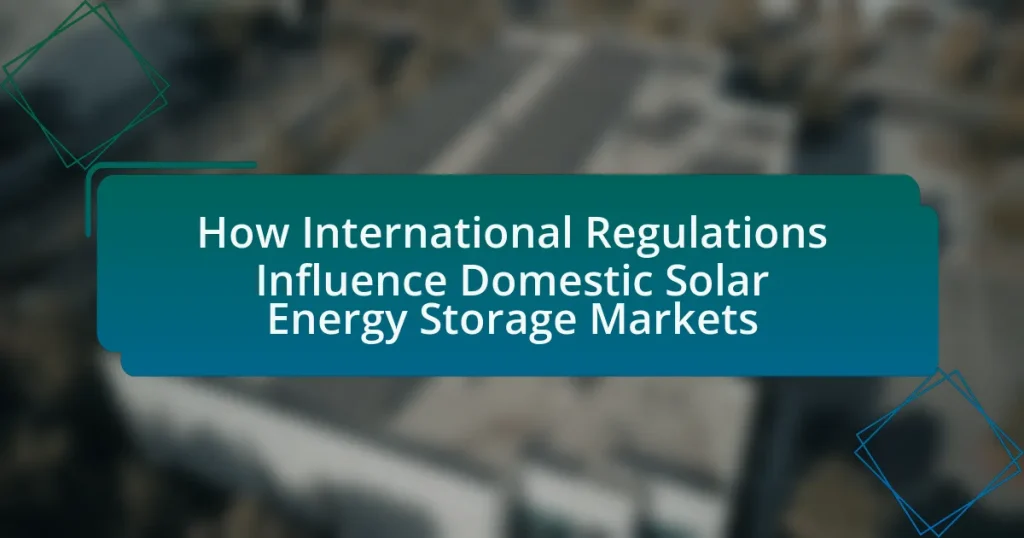The article examines how international regulations shape domestic solar energy storage markets, highlighting the influence of standards and frameworks on technology, safety, and trade. Key regulations discussed include the United Nations Framework Convention on Climate Change, the Paris Agreement, and International Electrotechnical Commission standards, which collectively promote renewable energy adoption and establish performance benchmarks. The article also explores the variations in regulatory approaches across different countries, the implications of compliance and non-compliance, and the impact of regulations on investment, competition, and technology adoption within the solar energy storage sector. Additionally, it outlines strategies for domestic markets and companies to align with international regulations and overcome associated challenges.
How do international regulations shape domestic solar energy storage markets?


International regulations significantly influence domestic solar energy storage markets by establishing standards and frameworks that govern technology, safety, and trade. These regulations often promote the adoption of solar energy storage solutions by providing guidelines that ensure compatibility and efficiency, which can lead to increased consumer confidence and market growth. For instance, the International Electrotechnical Commission (IEC) sets global standards for solar energy technologies, which helps harmonize product specifications across countries, facilitating international trade and investment. Additionally, international agreements on climate change, such as the Paris Agreement, encourage countries to adopt renewable energy solutions, including solar storage, by setting emission reduction targets that drive domestic policies and incentives.
What are the key international regulations affecting solar energy storage?
Key international regulations affecting solar energy storage include the United Nations Framework Convention on Climate Change (UNFCCC), the Paris Agreement, and the International Electrotechnical Commission (IEC) standards. The UNFCCC establishes a framework for reducing greenhouse gas emissions, which indirectly influences solar energy storage by promoting renewable energy adoption. The Paris Agreement sets specific targets for countries to limit global warming, encouraging investments in solar technologies and storage solutions. Additionally, IEC standards provide guidelines for the safety and performance of energy storage systems, ensuring that products meet international safety and efficiency benchmarks. These regulations collectively shape the global landscape for solar energy storage, driving innovation and compliance in domestic markets.
How do these regulations vary across different countries?
Regulations regarding solar energy storage vary significantly across countries, influenced by factors such as government policies, market maturity, and technological advancements. For instance, in Germany, regulations promote decentralized energy production and storage through incentives like feed-in tariffs and subsidies, fostering a robust solar storage market. In contrast, the United States has a more fragmented regulatory landscape, with states like California implementing aggressive net metering policies and storage incentives, while others may lack comprehensive support. Additionally, countries like China have implemented stringent regulations to boost domestic manufacturing and deployment of solar storage technologies, resulting in rapid market growth. These variations illustrate how local regulatory frameworks shape the development and adoption of solar energy storage solutions globally.
What role do international agreements play in shaping these regulations?
International agreements play a crucial role in shaping regulations for domestic solar energy storage markets by establishing common standards and frameworks that countries adopt. These agreements, such as the Paris Agreement, promote commitments to reduce greenhouse gas emissions and encourage the adoption of renewable energy technologies, including solar energy storage. By aligning national policies with international objectives, countries can enhance cooperation, share best practices, and attract investment in solar energy infrastructure. For instance, the International Renewable Energy Agency (IRENA) reports that international collaboration can lead to improved technology transfer and innovation, which are essential for developing efficient solar energy storage solutions.
Why are international regulations important for domestic markets?
International regulations are important for domestic markets because they establish a framework that ensures consistency, safety, and competitiveness across borders. These regulations help domestic markets align with global standards, which can enhance product quality and consumer protection. For instance, the International Electrotechnical Commission (IEC) sets standards for solar energy technologies, ensuring that products meet safety and performance criteria. Compliance with such international standards can facilitate trade, attract foreign investment, and promote innovation within domestic markets, ultimately leading to economic growth and sustainability in sectors like solar energy storage.
How do regulations impact investment in solar energy storage?
Regulations significantly impact investment in solar energy storage by establishing the legal framework and incentives that guide financial decisions. For instance, government policies such as tax credits, rebates, and renewable energy standards can enhance the attractiveness of solar energy storage projects, leading to increased capital flow into the sector. According to the International Renewable Energy Agency, countries with supportive regulatory environments, such as feed-in tariffs and net metering, have seen a marked increase in investments, with global investments in energy storage reaching $6.6 billion in 2020. These regulations not only lower the financial risks associated with solar energy storage but also encourage innovation and competition among market players, ultimately driving down costs and improving technology.
What are the implications of non-compliance with international regulations?
Non-compliance with international regulations can lead to significant legal, financial, and operational consequences for businesses and countries involved in the solar energy storage market. Legal repercussions may include sanctions, fines, or restrictions on trade, which can hinder market access and competitiveness. Financially, companies may face increased costs due to penalties or the need to implement corrective measures, impacting profitability. Operationally, non-compliance can disrupt supply chains and project timelines, leading to inefficiencies and loss of consumer trust. For instance, the European Union’s regulations on renewable energy standards have resulted in penalties for companies that fail to meet compliance, demonstrating the tangible risks associated with non-adherence.
What are the specific impacts of international regulations on domestic solar energy storage?


International regulations significantly impact domestic solar energy storage by shaping market access, technology standards, and financial incentives. These regulations often dictate the compatibility of imported storage technologies with local systems, influencing the availability and cost of solar energy storage solutions. For instance, the European Union’s Renewable Energy Directive sets stringent sustainability criteria that affect how domestic markets source and utilize energy storage technologies. Additionally, international trade agreements can either facilitate or hinder the import of advanced storage systems, directly affecting domestic pricing and innovation. Such regulations also influence funding opportunities, as compliance with international standards can unlock grants and subsidies for domestic solar energy projects, thereby promoting growth in the sector.
How do regulations influence technology adoption in domestic markets?
Regulations significantly influence technology adoption in domestic markets by establishing the legal framework and standards that govern the use of new technologies. For instance, regulations can incentivize the adoption of solar energy storage technologies through tax credits, rebates, or grants, which lower the financial barriers for consumers and businesses. A study by the International Renewable Energy Agency (IRENA) found that countries with supportive regulatory frameworks saw a 50% increase in solar energy adoption compared to those with less favorable regulations. Additionally, regulations can mandate certain performance standards, ensuring that technologies meet safety and efficiency benchmarks, which can enhance consumer confidence and drive adoption.
What technologies are most affected by these regulations?
The technologies most affected by international regulations in the context of solar energy storage markets include lithium-ion batteries, solar photovoltaic systems, and energy management systems. Lithium-ion batteries are impacted due to regulations on materials sourcing and recycling, which aim to ensure sustainable practices and reduce environmental harm. Solar photovoltaic systems face regulations related to efficiency standards and grid integration requirements, influencing their design and deployment. Energy management systems are affected by regulations that govern data privacy and interoperability, which are essential for optimizing energy use and storage. These technologies must adapt to comply with evolving international standards, which can shape market dynamics and innovation in the solar energy sector.
How does regulation affect the cost of solar energy storage solutions?
Regulation significantly impacts the cost of solar energy storage solutions by establishing standards, incentives, and tariffs that influence market dynamics. For instance, government policies such as tax credits and rebates can lower the upfront costs for consumers, making solar energy storage more accessible. According to the U.S. Energy Information Administration, the federal Investment Tax Credit (ITC) allows homeowners to deduct a percentage of the cost of solar systems from their federal taxes, which has been shown to stimulate market growth and reduce overall costs. Additionally, regulations that promote competition among manufacturers can lead to lower prices through innovation and economies of scale. Conversely, stringent regulations can increase compliance costs, potentially raising prices for consumers.
What are the market dynamics influenced by international regulations?
International regulations significantly influence market dynamics by shaping trade policies, compliance costs, and competitive advantages. For instance, regulations such as tariffs on imported solar technology can alter pricing structures, affecting supply and demand within domestic markets. Additionally, international agreements on emissions reductions can incentivize investments in renewable energy technologies, thereby increasing market growth. A study by the International Renewable Energy Agency (IRENA) highlights that countries adhering to international climate agreements tend to experience accelerated adoption of solar energy solutions, demonstrating a direct correlation between regulatory frameworks and market expansion.
How do regulations affect competition among domestic solar energy storage providers?
Regulations significantly impact competition among domestic solar energy storage providers by establishing standards that can either facilitate or hinder market entry. For instance, stringent safety and performance regulations may raise operational costs for new entrants, thereby limiting competition. Conversely, supportive regulations, such as tax incentives or subsidies for renewable energy technologies, can enhance market attractiveness and encourage more providers to enter the sector. According to the International Renewable Energy Agency, countries with favorable regulatory frameworks have seen a 30% increase in new solar energy storage installations, demonstrating that effective regulations can stimulate competition and innovation within the market.
What market trends emerge as a result of international regulatory frameworks?
International regulatory frameworks lead to increased standardization and innovation in solar energy storage markets. These frameworks often establish common safety and performance standards, which facilitate cross-border trade and investment. For instance, the International Electrotechnical Commission (IEC) has developed standards that enhance product compatibility and reliability, encouraging manufacturers to innovate and improve their technologies. Additionally, regulatory frameworks can drive market growth by providing incentives for renewable energy adoption, as seen in the European Union’s Renewable Energy Directive, which mandates a certain percentage of energy to come from renewable sources, thereby boosting demand for solar energy storage solutions.
How can domestic markets adapt to international regulations in solar energy storage?


Domestic markets can adapt to international regulations in solar energy storage by aligning their standards and practices with those established globally. This alignment can be achieved through the adoption of internationally recognized certifications, such as those from the International Electrotechnical Commission (IEC), which ensure that products meet safety and performance criteria. Additionally, domestic markets can engage in policy harmonization, where local regulations are modified to reflect international guidelines, facilitating smoother trade and compliance. For instance, countries that have adopted the IEC 62619 standard for battery safety have seen increased market access and competitiveness. By investing in training and education for stakeholders on international regulations, domestic markets can further enhance their ability to comply and innovate within the global framework.
What strategies can domestic companies employ to comply with international regulations?
Domestic companies can employ several strategies to comply with international regulations, including conducting thorough regulatory research, implementing compliance management systems, and engaging in continuous training for employees. Regulatory research allows companies to understand the specific requirements of different markets, ensuring they align their operations accordingly. Compliance management systems help in tracking and managing compliance obligations effectively, reducing the risk of violations. Continuous training ensures that employees are aware of the latest regulations and best practices, fostering a culture of compliance within the organization. These strategies are essential for navigating the complexities of international regulations, particularly in the solar energy storage sector, where adherence to standards can significantly impact market access and competitiveness.
How can companies leverage international regulations for competitive advantage?
Companies can leverage international regulations for competitive advantage by aligning their operations with compliance standards that enhance market access and credibility. By adhering to international regulations, such as those set by the International Electrotechnical Commission (IEC) for solar energy products, companies can differentiate themselves in the market, ensuring their products meet global safety and performance benchmarks. This compliance not only facilitates entry into foreign markets but also builds trust with consumers and partners, as evidenced by the fact that companies meeting these standards often experience increased sales and market share. Furthermore, companies that proactively adapt to evolving regulations can capitalize on incentives and subsidies offered by governments aiming to promote renewable energy, thereby enhancing their profitability and sustainability in the competitive landscape.
What best practices should companies follow to ensure compliance?
Companies should implement a comprehensive compliance program that includes regular training, risk assessments, and adherence to relevant regulations. Regular training ensures that employees are aware of compliance requirements and updates, while risk assessments help identify potential compliance gaps. Adhering to international regulations, such as those set by the International Electrotechnical Commission (IEC) for solar energy systems, is crucial for maintaining standards and avoiding penalties. Additionally, establishing a clear reporting mechanism for compliance issues fosters transparency and accountability within the organization.
What challenges do domestic markets face in aligning with international regulations?
Domestic markets face significant challenges in aligning with international regulations, primarily due to differences in regulatory frameworks and compliance costs. These markets often struggle with adapting existing laws to meet international standards, which can lead to inconsistencies and confusion among stakeholders. Additionally, the financial burden of compliance can be substantial, particularly for smaller companies that may lack the resources to navigate complex regulatory environments. For instance, a report by the International Renewable Energy Agency highlights that varying safety and performance standards across countries can hinder the adoption of solar energy technologies, impacting market growth and investment.
How can domestic markets overcome regulatory barriers?
Domestic markets can overcome regulatory barriers by actively engaging in policy advocacy and collaboration with regulatory bodies. This approach allows stakeholders to influence the development of regulations that facilitate market growth. For instance, industry associations can lobby for streamlined permitting processes and incentives for solar energy storage, which have been shown to enhance market participation and investment. A study by the International Renewable Energy Agency highlights that countries with proactive regulatory frameworks, such as Germany, have successfully increased solar energy adoption by reducing bureaucratic hurdles.
What support systems are available for companies navigating these challenges?
Companies navigating challenges in the solar energy storage market can access various support systems, including government incentives, industry associations, and financial assistance programs. Government incentives, such as tax credits and grants, help reduce the financial burden of compliance with international regulations. Industry associations provide resources, networking opportunities, and advocacy to influence policy decisions that affect the market. Financial assistance programs, including low-interest loans and investment funds, offer capital to support innovation and expansion in the solar energy sector. These support systems are crucial for companies to adapt to regulatory changes and remain competitive in the evolving market landscape.
What practical steps can stakeholders take to enhance compliance with international regulations?
Stakeholders can enhance compliance with international regulations by implementing robust training programs focused on regulatory requirements. These programs should educate employees about specific international standards relevant to solar energy storage, such as ISO 50001 for energy management systems. Additionally, stakeholders should establish regular audits to assess compliance levels and identify areas for improvement, ensuring adherence to regulations like the EU’s Renewable Energy Directive. Furthermore, collaboration with regulatory bodies can provide stakeholders with insights into upcoming changes in regulations, allowing for proactive adjustments in practices. Data from the International Energy Agency indicates that companies with structured compliance frameworks experience a 30% reduction in regulatory breaches, underscoring the effectiveness of these practical steps.


